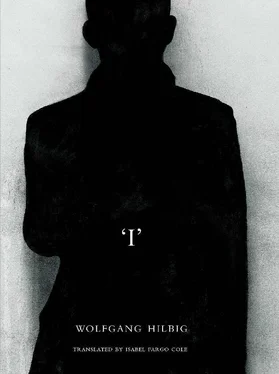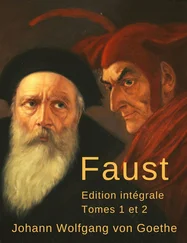He waited for someone to come back down, in vain, and Frau Falbe didn’t show up again that evening. — The entire time he pictured how she’d show up. . and how he would act: nervous, of course, incapable of producing the trivial phrases which would remove the tension in the room. . while she chattered, vacuous things, but things which in their very noncommittal nature created the lukewarm atmosphere in which you could swim together. . He never would have pulled that off!
(Don’t you remember my name. . You asked me my name. . You must have thought I’d forgotten it myself. . Allow me to introduce myself: Cambert!. . thus various attempts at conversation with the student had ended.)
He had always been after unambiguity, after unequivocal behaviour, after unambiguous statements. . in stark contrast to the texts that lay before him on the desk in the dark.—W. had so far been certain of Feuerbach’s appreciation. — The things you write, he’d said, sound cryptic the first time you hear them, but your work is very obviously an attempt to gain clarity about something. And so ultimately we have something in common which you shouldn’t underestimate. .
Incidentally, there’s another thing in common, he said after a while. You have pieces there where there’s much more clarity. Those are the pieces you’re supposed to hold back for now. In our metier, too, we always know more than we let on. One might say that we practically have to compel the object of our interest to make a move, that is, we must be able to wait until things reveal themselves in their nakedness. Doesn’t that mean we work along exactly the same lines?
At some point you said we don’t wait, we practically force people’s fates. But that is our way of waiting, we never said we won’t take the offensive. For instance, what would have happened if no one had fiddled with your literary progress. .? To this day you’d probably still be huddling in your garret over your unpublished works. . you’d never have been in these two anthologies, what were they called again: Theatre of Sparrows or Circus of Mice . . good Lord, the titles the intelligentsia comes up with! Or would you rather just be published in the samizdats, and under a pseudonym at that. .?
(It’s not your words that are inscrutable, it’s the things you’re trying to assimilate, or at least they seem that way, said Feuerbach. . it was one of those conversations which W. saw coming to a bad end from the outset. Evidently Feuerbach realized himself how contradictory his words were, and his voice was testy: You’re right, that’s a problem, but it has a solution. Can we help it, for instance, if everyone speaks in riddles these days? What can we find out despite that about the way people think in this city, for instance? You’ll concede that this knowledge is significant for the State authorities. . or at least interesting, am I right? I’d say it’s crucial. Understandably, the figures who regard themselves as the authorities don’t have the option of talking to the so-called man on the street every day. Besides, the man on the street would have far too many inhibitions to speak his mind to state officials. . I, for one, sometimes feel like that nice sultan who dresses in rags and joins the camel drivers at their campfire to listen to his subjects’ complaints. . or I feel like the sultan’s right hand, at least. No, let’s stick to the issue we’re faced with, we who’ve always got our ear to the masses — W. had the impression that he meant these sorts of clichés seriously, that his irony was a mere convention — or what we’ve heard with this ear is just the people’s usual blabbing, the completely meaningless chatter. And our task is to take that and filter out a picture of the underlying thoughts for ourselves.
For ourselves? W. broke in. I thought the picture was supposed to be for the authorities.
It’s supposed to be. But even if we know the people’s thinking, that doesn’t mean we have a picture we can convey to the State, not by a long shot. First we have to take the people’s thinking and construct statements of fact, as it were. And of course we have to supply the implications of the statements at the same time.
And if that doesn’t work out, the facts have to be filled in. . W. presumably didn’t say these words out loud, perhaps because he would only have been repeating himself, for the umpteenth time, and not getting anywhere.
And Feuerbach, too, was more and more apt to repeat himself, but still had the nerve to declare this a sign of stagnation. . And one day this stagnation will bring us crashing down, it might not be much longer now! — At that moment he was on his way to the bar to bring back drinks he’d ordered a long time ago; the waiter seemed sunk in a profound reverie, and the two filled beer glasses stood orphaned under the tap. Observing the first lieutenant’s slender figure from behind, W. thought he saw him reel a bit. Lately he seemed to notice more and more often that his superior was losing certain nuances of his well-rehearsed elegance. . Something about Feuerbach is flaking off, he thought. Or was it a universal dissonance that was spreading through the city? — And one result was that Feuerbach had little use now for the reports that reached him from the so-called Scene. . because the people in the Scene were acting just plain indifferent , as the first lieutenant put it.
As if they were learning from us! he said. W. remembered this so vividly because the words seemed so astute to him. — As if they’d suddenly started seeing things the way we do, he said. Now all we need is for them to think we ’ re indifferent.
I could confirm that, said W.
There you go, ultimately we are, aren’t we. . they must have once had a completely false, falsified image of us, who taught them that? The cliques that are in the West now, or what? And in the Scene they’re suddenly seeing the light. Because aren’t we actually extremely indifferent. . that’s our strength, you see. Or did anyone ever demand conviction from you?
Returning to the table, Feuerbach set down the two glasses; suddenly he had a grim expression on his face. — Maybe he was annoyed at the waiter? thought W.; that couldn’t be, since otherwise he found the waiter’s absentmindedness perfectly OK. — Cheers! Feuerbach’s voice had a hard edge. Do you have the faintest notion what I think sometimes?
W., his head tipped back to drink, gave him a questioning look.
Or what I actually think almost all the time? I think the reports you give me are all faked! Don’t say anything, let me finish. . at least they’ve been faked for quite a while. You know what you’re doing, my dear man, you’re writing poetry! Yes, you’re writing poetry even in your dossiers. But you’re doing it badly, if only you’d do it right. You’re doing the same thing you do with your poetry, you only hand in the second-rate stuff. Lately your reports are second rate too, edited and watered down. .)
How could he claim to know that? At what point in the reports could this suspicion have dawned on him. . an absurd suspicion, in W.’s view. — And perhaps it was only a blanket suspicion: since everyone was suspicious, at irregular intervals everyone was placed under suspicion. At any rate, infinite grounds for suspicion were always available: the most idiotic conjectures, the most unforeseeable, it was part of the routine that they came like bolts from the blue. . for instance, it had come to light that the lists of coup d ’ etat suspects put together by the Soviet state security service included, among others, the name Walter Ulbricht.8—When you needed security, you also needed suspicion; that was logical.
W. could no longer recall whether he had denied the accusation. . apparently he had simply said nothing. The matter was far from cleared up. . but it was like Feuerbach to leave him saddled with accusations. He was a trained security man, and he knew the devastating effects of deferment. — And finally it wasn’t clear either whether the suspicion Feuerbach voiced might not give cause for hope — to the effect that he was no use any more because he was unreliable! — Maybe they wouldn’t even come and get him. . maybe the best thing was to hold out here at Frau Falbe’s and see what happened.
Читать дальше












